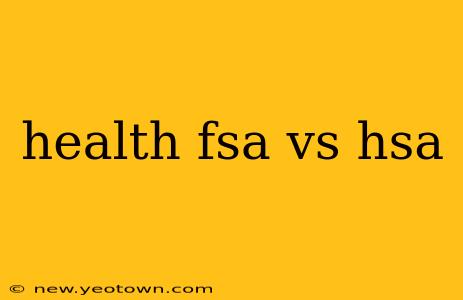Choosing the right healthcare savings plan can feel like navigating a maze. Two prominent players in this arena are the Health FSA (Flexible Spending Account) and the HSA (Health Savings Account). While both offer tax advantages to help you pay for medical expenses, they differ significantly in their structure, eligibility, and overall flexibility. Let's unravel the mysteries of these accounts with a story…
Imagine Sarah, a young professional starting her career, and Mark, an established business owner. Both are looking for ways to save on healthcare costs. Sarah opts for a Health FSA, while Mark chooses an HSA. Their journeys highlight the key distinctions between these two popular savings vehicles.
What is a Health FSA?
Sarah's employer offers a Health FSA, and she decides to contribute. A Health FSA is a pre-tax savings account offered by employers to help employees pay for eligible medical expenses. Think of it as a set-aside pot of money specifically for healthcare costs. Sarah contributes a portion of her paycheck pre-tax, effectively lowering her taxable income. The money is then available to cover medical expenses throughout the year. The catch? Use it or lose it. Any money left in Sarah's Health FSA at the end of the year is typically forfeited.
What are the common uses of a Health FSA?
Sarah uses her Health FSA for things like doctor visits, prescription medications, and dental care. However, she also discovers that many over-the-counter medications, eyeglasses, and even some types of alternative therapies are eligible expenses. She finds a detailed list provided by her employer, clarifying which expenses are covered. It's important to note that eligibility and specific allowable expenses can vary between employers.
Are there any downsides to a Health FSA?
One significant drawback Sarah discovers is the "use-it-or-lose-it" nature of the FSA. She meticulously tracks her expenses, striving to use the entire balance before the year ends. Missing this deadline means losing the money, a situation many FSA users encounter. This aspect demands careful budgeting and expense planning.
What is an HSA?
Mark, on the other hand, has an HSA linked to his high-deductible health plan. An HSA is a tax-advantaged savings account that individuals can open if they have a qualifying high-deductible health plan (HDHP). Unlike the Health FSA, the money in an HSA belongs entirely to Mark, even if he changes jobs or health insurance plans. He can contribute each year, and the money grows tax-free. There's no "use-it-or-lose-it" rule – funds roll over year after year.
What can I use an HSA for?
Mark uses his HSA similarly to Sarah, paying for routine medical expenses like doctor visits and prescriptions. But the flexibility of the HSA goes beyond that. He can also use the funds for qualified long-term care expenses or even contribute to a health savings account after retirement. The HSA becomes a versatile tool for managing healthcare costs throughout his life.
What are the advantages of an HSA compared to an FSA?
Mark's experience highlights the significant benefits of an HSA. The triple tax advantage (tax-deductible contributions, tax-deferred growth, and tax-free withdrawals for qualified medical expenses) makes it a powerful savings vehicle. He appreciates the portability of the HSA, knowing his funds are secure even if his employment or insurance changes. The HSA's rollover feature also allows him to accumulate funds over time, creating a substantial nest egg for future healthcare costs.
Health FSA vs. HSA: Key Differences Summarized
| Feature | Health FSA | HSA |
|---|---|---|
| Employer-sponsored | Yes | No (linked to a high-deductible plan) |
| Contribution Limit | Set annually, usually lower than HSA | Set annually, higher than FSA |
| Rollover | Typically no rollover | Funds roll over year to year |
| Tax advantages | Pre-tax contributions | Triple tax advantage |
| Eligibility | Determined by employer | Requires a high-deductible health plan |
Frequently Asked Questions (FAQ)
Can I contribute to both an FSA and an HSA?
No. You cannot contribute to both an FSA and an HSA simultaneously. They are mutually exclusive options.
What is a high-deductible health plan (HDHP)?
An HDHP is a health insurance plan with a higher deductible than a standard plan, but typically lower monthly premiums. You need an HDHP to be eligible to open an HSA.
What happens if I don't use all the money in my FSA?
Most FSAs operate under a "use-it-or-lose-it" policy. Un-used funds are typically forfeited at the end of the plan year. Some employers offer a grace period or allow for a limited rollover amount.
Can I use my HSA for expenses beyond medical care?
While HSA funds are primarily for qualified medical expenses, there are some exceptions. For example, qualified long-term care expenses can be paid using HSA funds. Always check with your HSA provider for specifics.
Can I invest my HSA money?
With most HSAs, you can invest your HSA funds. This allows your savings to potentially grow faster than with a regular savings account.
Ultimately, the best choice between a Health FSA and an HSA depends on individual circumstances, such as your health needs, income, and health insurance plan. Carefully consider your healthcare spending habits and future needs before making a decision. Consult with your employer and a financial advisor for personalized guidance.

